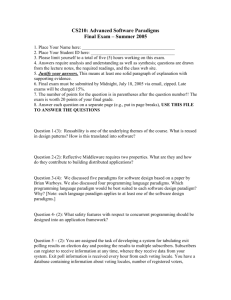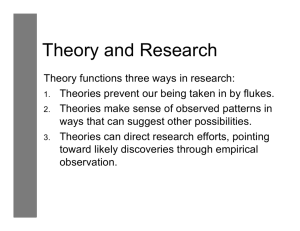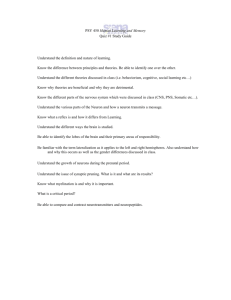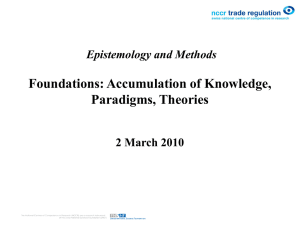PPT - Gmu
advertisement
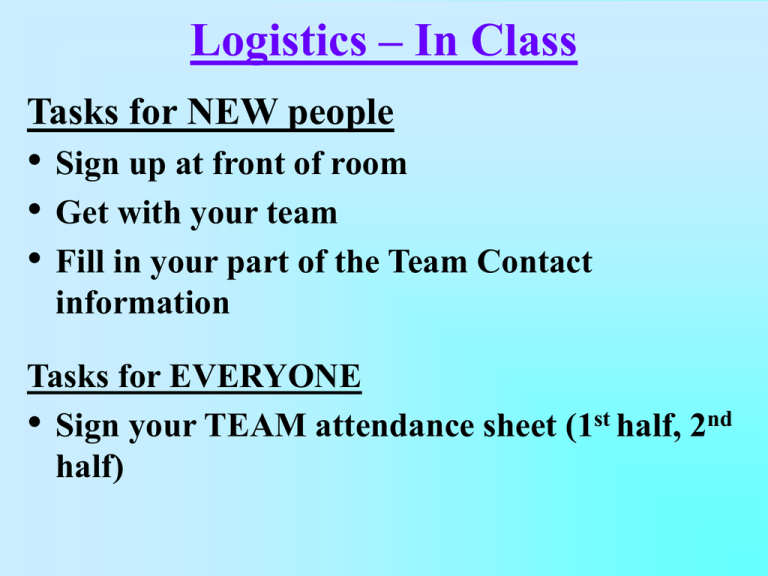
Logistics – In Class Tasks for NEW people • Sign up at front of room • Get with your team • Fill in your part of the Team Contact information Tasks for EVERYONE • Sign your TEAM attendance sheet (1st half, 2nd half) COMM 250 Agenda - Week 2 Housekeeping / Logistics • Form the Remaining Teams • ?? Syllabus Questions ?? • Folders: Attendance Sheets • Team Pictures – We Start Tonight In-Class “Practice RAT” Implicit and Explicit Course Agreements Setting Grade Weights I – Team Negotiations Lecture • Concepts, Theories, & Paradigms Team Exercise 2 Logistics – In Class Assignments Due Next Week: • RAT1 Next Week (begins at 4:30) • TP1 • Practice RAT test on Web CT (Required) • I Will E-mail WebCT Details to the Listservs Thursday by 12 midnight Tasks for each TEAM: • Team’s First Cut at 2 Grade Weights Decisions • Set Meeting for TP1, TP2 Housekeeping – After Class Tasks for EVERYONE: Sign up for your TA’s LISTSERV • “comm250a” = # 1-12 = Green = Judy Knight • “comm250b” = # 13-24 = Red = David Mercer • “comm250c” = # 25-36 = Yellow = Joseph Wen Tasks for each TEAM: Only if you did NOT get and fill out the TA’s MS Word document last week: • E-mail your TA and request the MS Word document • Return that doc with “Team Contact Information” to your TA by Saturday How Do We “KNOW” Things? • Experiential Reality Firsts Hand Experience Done There; Been That ! Agreement Reality Second Hand Knowledge Tradition and/or Authority Both Can Assist or Hinder Inquiry Science: A Special Standard for “Agreement Reality” The Research Process • Conceptualization • Planning & Designing Research • Methods for Conducting Research • Analyzing & Interpreting Data • Re-Conceptualization Types of Research Research based in Positivism • Objective World • Quantitative Methods • Researcher is a Dispassionate Observer Research based in Naturalism • Subjective World • Qualitative Methods • Researcher is Part of the Research The World of Concepts Concepts are: • “Mental images;” Ideas • Can represent things in the physical world • Concepts are not real – that is, • They don’t exist as physical objects • IQ, love, anger, conservative, liberal, life, death, terrorism • Some physical objects are also concepts • Table, chair, tree, building, sky, computer The World of Theories Theories are: • Structures of knowledge • Representations of the physical world that live in the world of ideas • (Rough) approximations of events • Theories are “Useful Fictions” • Scientists don’t think of theories as “true” or “false” - because they are simply tools • When a better approximation is available, scientists switch theories • Lessons: The Theory of Evolution Theories Outside of Science We all have many “informal” theories • Beliefs about how the world works • Predictions about what will happen • Judgments about how people are • Sometimes these are based on data • Sometimes even on good data! • Scientific theories are different – they are “informed” theories The World of Paradigms Paradigms are: • Over-arching structures of knowledge • Representations of the physical world that live • • • in the world of ideas Approximations of events Paradigms are “Useful Fictions” • Paradigms are not “true” or “false” - they are simply tools • When a better approximation is available, scientists switch paradigms Lessons: Newtonian Mechanics Relativity Paradigms Outside of Science The term is used freely today • Stuffed crust pizza is a “new paradigm” Paradigm is used to denote smaller changes • In accepted processes • In common practices • In common beliefs • That’s ok; just keep in mind that in science, “paradigm shifts are very rare In-Class Team Exercise # 2 1) Two rounds of “Name Calling!” • Deliverable: no written deliverable 2) Paradigms & Paradigm Shifts • • Deliverable: list 6 major paradigm shifts in society Additional Team Work • Discuss Grade Weights • Choose a team name • Plan TP1: Meet before next Wed. • Plan TP2: Peer Evaluation P&C
